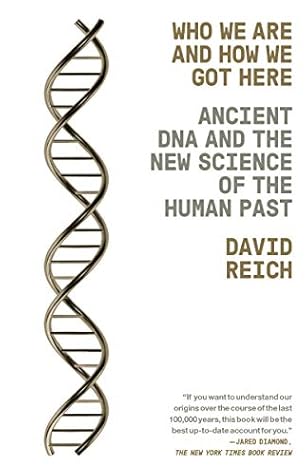More on this book
Community
Kindle Notes & Highlights
by
David Reich
Read between
January 16 - May 1, 2020
We discovered that the population of northern Europe was largely replaced by a mass migration from the eastern European steppe after five thousand years ago18;
Over the approximately three billion letters, there are typically around three million differences between unrelated genomes.
A genome consists of twenty-three chromosomes, and because a person carries two genomes, one from each parent, the total number is forty-six. But the chromosomes themselves are mosaics of even smaller tiles. For example, the first third of a chromosome a woman passes down to her egg might come from her father and the last two-thirds from her mother, the result of a splicing together of her father’s and mother’s copies of that chromosome in her ovaries. Females create an average of about forty-five new splices when producing eggs, while males create about twenty-six splices when producing
...more
This highlight has been truncated due to consecutive passage length restrictions.
Twenty generations in the past, the number of ancestors is almost a thousand times greater than the number of ancestral stretches of DNA in a person’s genome, so it is a certainty that each person has not inherited any DNA from the great majority of his or her actual ancestors.
We found that non-African genomes today are around 1.5 to 2.1 percent Neanderthal in origin,24 with the higher numbers in East Asians and the lower numbers in Europeans, despite the fact that Europe was the homeland of the Neanderthals.
What we had found was evidence that people in northern Europe, such as the French, are descended from a mixture of populations, one of which shared more ancestry with present-day Native Americans than with any other population living today.
Around thirty-nine thousand years ago, a supervolcano near present-day Naples in Italy dropped an estimated three hundred cubic kilometers of ash across Europe, separating archaeological layers preceding it from those that succeeded it.21 Almost no Neanderthal remains or tools are found above this layer, suggesting that the climate disruption produced by the volcano, which could have produced multiyear winters, may have compounded competition with modern humans to create a crisis that drove Neanderthals to extinction. But the Neanderthals were not the only ones in crisis.
The extraordinary fact that emerges from ancient DNA is that just five thousand years ago, the people who are now the primary ancestors of all extant northern Europeans had not yet arrived.
the single most important source of ancestry across northern Europe today is the Yamnaya or groups closely related to them.
The Indian subcontinent is one of the breadbaskets of the world—today it feeds a quarter of the world’s population—and
the degree of genetic differentiation among Indian jati groups living side by side in the same village is typically two to three times higher than the genetic differentiation between northern and southern Europeans.
In Mexico, the Spanish burned indigenous books, and so most Native American writing literally went up in flames.
Another strong response to genetic research on Native Americans came from the Havasupai,
Navajos were created by Changing Woman; therefore they know where they came from.”
In an astonishing development in 2008, the American linguist Edward Vajda documented a deeper connection between Na-Dene languages and a language family of central Siberia called Yeniseian,
slaves had little ability to organize or resist. Most were sold in South America or the Caribbean, where they were often worked to death. Around 5 to 10 percent were brought to what became the United States.
Even in the United States, where European Americans are still in the majority, African Americans and Latinos comprise around a third of the population. Nearly all individuals from these mixed populations derive large stretches of their genomes from ancestors who lived on different continents fewer than twenty generations ago. A small percentage of European Americans have large stretches of African or Native American DNA as well, the legacy of people who successfully “passed” themselves off into the white majority.
prostate cancer, which occurs at about a rate 1.7 times higher in African Americans than in European Americans.
After a living thing dies, half the carbon-14 atoms decay into nitrogen-14 within 5,730 years.


